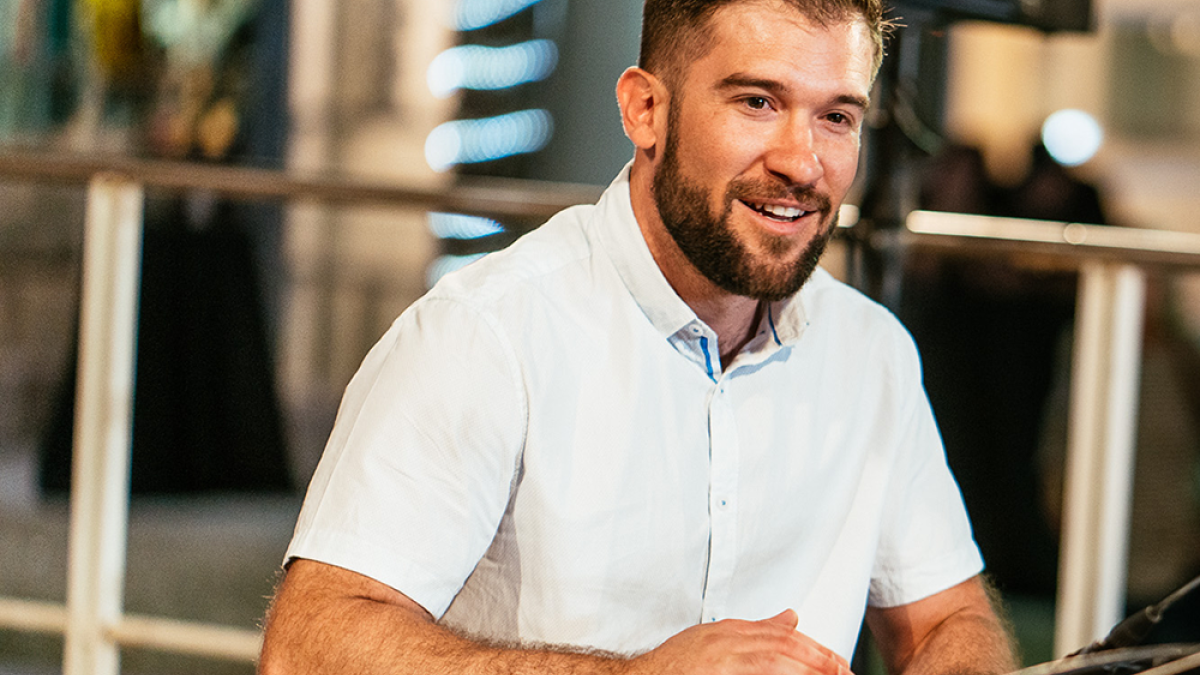Beat producer, Latin percussionist named popular music assistant director

Samuel Peña
The School of Music, Dance and Theatre at Arizona State University is pleased to announce Samuel Peña as clinical assistant professor and assistant director of the popular music program.
“We are thrilled to have attracted Samuel Peña to the ASU popular music program,” said Heather Landes, director of the School of Music, Dance and Theatre. “Samuel Peña is a leader and an expert at bringing people together through music and creating meaningful partnerships and collaborative projects that we know will help to advance our program and provide outstanding educational opportunities for our students.”
Peña has been around music all of his life, but said he never thought he would be a music educator. He created and recorded music every day, but he never thought of himself as a musician.
“Hip-hop, house, funk, rock and Latin pop weren’t things you could learn in school,” Peña said. “Those were things we had to find outside of music programs — it was just something we did, and we had to. It gave us life.”
In March 2020, when he attended the groundbreaking for the Fusion on First building in Phoenix, home to the Popular Music program, Peña said he knew he wanted to be part of a music program for artists like himself.
The students and faculty moved into the new facility in fall 2021. The program’s director, Erin Barra-Jean, was on maternity leave, and Peña was asked to serve as interim director.
“It was a really big opportunity for me,” Peña said. “I wanted to contribute as many skills as I could offer to the school so it can be successful. My approach to building relationships in the community has been to create educational experiences through popular music. The idea of a popular music program at ASU is a dream come true.”
Given the projected growth in the program, Landes determined the program needed an assistant director and promoted Peña to the position.
“I’m very excited that the popular music program exists,” Peña said.
Born in Guadalajara, Mexico, and raised in the United States, Peña says his father always wanted him to play rock and roll music with him, but he was interested in hip-hop. His mom wanted him to join a school band, so he tried the clarinet, but that wasn’t his interest either. He enjoyed playing congas, producing beats and making mixtapes off the radio.
Peña said he learned popular music on his own. He studied with master drum teachers and singers in Puerto Rico and Cuba, and worked with Afro Brazilians in the United States to learn their music. He learned hip-hop from friends, older hip-hop music makers and online.
Since most music schools did not offer programs for a music producer or Latin pop percussionist, Peña continued music on the side and pursued a bachelor’s degree in communication with a minor in social psychology at ASU. His passion for music and the social connections it creates led him to pursue a master’s degree in music education, to learn how to create a learning environment for students and community, including students who did not fit into traditional music programs.
He began teaching Afro-Cuban and Afro-Brazilian rhythms and electronic music production at community centers and in K–12 music programs around the Valley.
“The first time that I studied music in an institution was at ASU, and the first time I felt like I fit in a music program was the master’s in music education,” Peña said. “I was a teaching artist working and teaching music production around the Valley, and I wanted to refine my music education skills so that I could be a more effective teacher. The program was focused on community music and on participatory music curriculum design, so I was learning and then applying those skills with students right away.”
One of Peña’s goals, he said, is to help students create a career for themselves where they can be versatile, flexible and develop skills in areas such as sound engineering, live sound, producing, label services, songwriting, performance and composition for film and gaming.
“There are a lot of crossovers that can happen musically,” Peña said. “It's not about popular music for the sake of popular music, it's also about becoming an expert in multiple facets within popular music so one can amplify and intersect across the different musical genres and creative arts fields. We are helping students to develop a career where they can support themselves and their families through music, creativity and business. We want them to be collaborative, develop an entrepreneurial mindset and build the skill sets needed to curate a long successful career in music.
“I want our students’ musical success to be inevitable, and I’m so excited they can do that with the popular music program. Now they can study what they love, fine tune it with the support of the program and shape the sounds of the future.”
More Arts, humanities and education

‘It all started at ASU’: Football player, theater alum makes the big screen
For filmmaker Ben Fritz, everything is about connection, relationships and overcoming expectations. “It’s about seeing…

Lost languages mean lost cultures
By Alyssa Arns and Kristen LaRue-SandlerWhat if your language disappeared?Over the span of human existence, civilizations have…

ASU graduate education programs are again ranked among best
Arizona State University’s Mary Lou Fulton College for Teaching and Learning Innovation continues to be one of the best…

